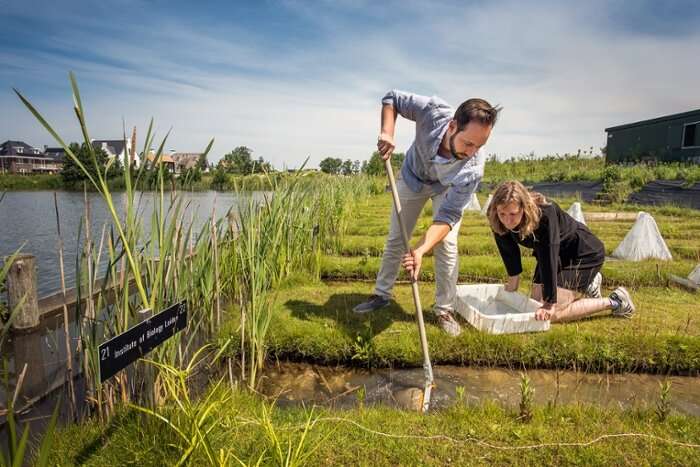Common insecticide linked to extreme decline in freshwater insects

The widely used pesticide thiacloprid can cause a large-scale decline in freshwater insects. This was discovered by researchers from the Living Lab in Leiden. For three months they counted the flying insects in the 36 ditches of the lab. Their research appeared in PNAS.
In the ditches of the Living Lab, Henrik Barmentlo and his colleagues exposed freshwater insects to different concentrations of thiacloprid. This substance belongs to the neonicotinoids, the world's most widely used group of insecticides. "We used realistic concentrations," says Barmentlo. They correspond to concentrations we actually measure in the surface water.
Dramatic decline in all species
That neonicotinoids can be harmful to many insects had already been proven. But there was no conclusive evidence that these insecticides are at least partly responsible for the large-scale insect decline.
Therefore, in a unique experiment, the researchers caught no less than 55,574 insects that flew out of the lab's 36 thiacloprid-contaminated ditches over a period of three months. Afterwards, they identified all specimens. They compared the results with nine control ditches, without added thiacloprid. Barmentlo: "We saw dramatic declines in all the species groups studied, such as dragonflies, beetles and sedges. Both in absolute numbers and in total biomass. In the most extreme scenario, the diversity of the most species-rich group, the dance flies, even dropped to a single species."
Consequences for the whole ecosystem
And that while all these insects have an important role in their ecosystem. For example, they serve as food for many insect-eating bird species. Previously, other researchers had already discovered that these bird species occur in lower numbers when there are more neonicotinoids in the water. Barmentlo: "So it is quite possible that these bird species suffer from a lack of insects, or in other words: food."
Barmentlo calls the results alarming. "Given the urgency of the large-scale decline in insects, we think the mass use of these insecticides should be reconsidered. In the EU, the use of thiacloprid was banned last year, but not yet in other parts of the world. In order to protect freshwater insects and all the life that depends on them, we must stop using these neonicotinoides as soon as possible."
More information: S. Henrik Barmentlo et al, Experimental evidence for neonicotinoid driven decline in aquatic emerging insects, Proceedings of the National Academy of Sciences (2021). DOI: 10.1073/pnas.2105692118
Journal information: Proceedings of the National Academy of Sciences
Provided by Leiden University





















